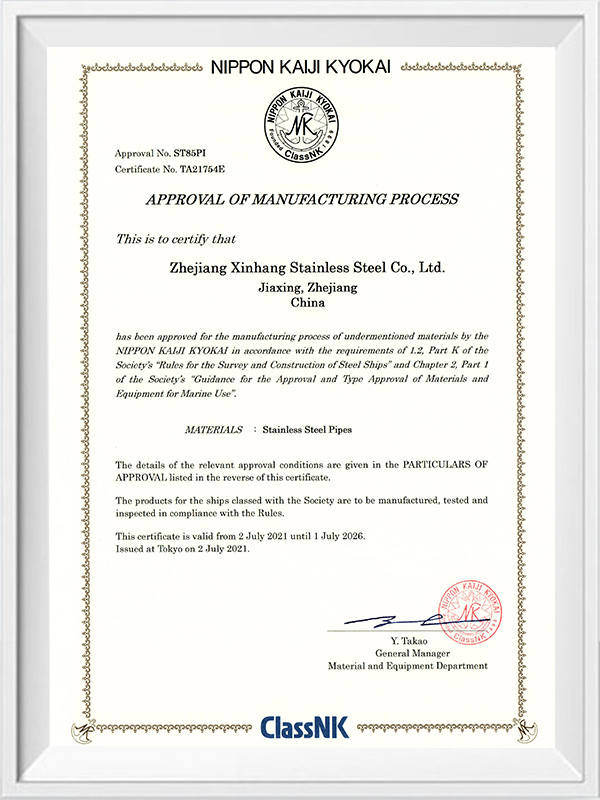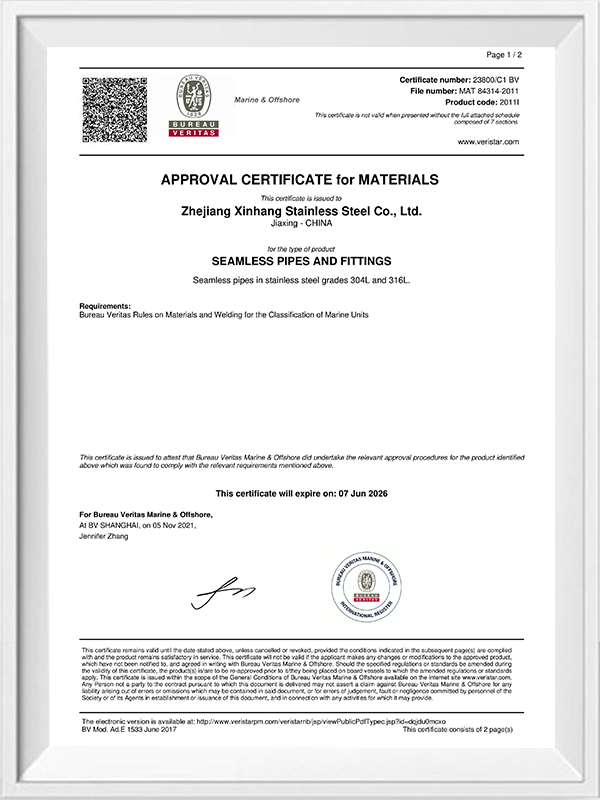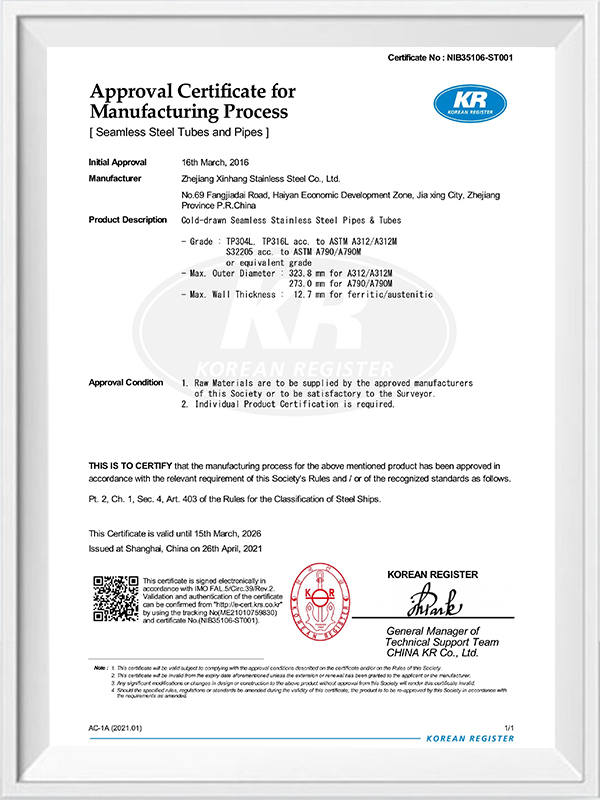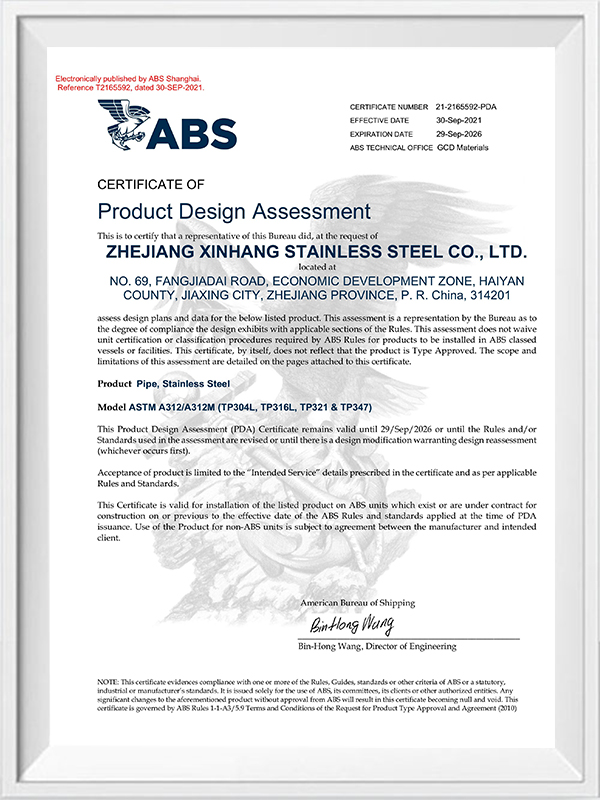

Xinhang Special Material Co., Ltd. Hangzhou Branch is China Stainless Steel Pipe For Chemical Industry Manufacturers and Stainless Steel Pipe For Chemical Industry Factory, founded in 2007 and moved to Longyou Economic Development Zone, Zhejiang Province, in 2022. It covers an area of 130,000 square meters, more than 30 production lines, 300 workers, 20 R&D people, 30 inspection people and an annual output of 50,000 tons.
It has passed ISO9001:2008 quality management system, PED 97/23/EC EU Pressure Equipment Directive certification, China Special Equipment Manufacturing License (Pressure Tube) TS certification, ASME certification, provincial enterprise standardization management system, ISO14000:2004 environment management system, cleaner production (green enterprise), and a series of certifications, as well as China Classification Society (CCS), American Bureau of Shipping (ABS), British Register of Shipping (LR), Deutsche Veritas (GL), Bureau Veritas Society (BV), Det Norske Veritas (DNV), and Korean Register of Shipping (KR) factory certification.
The main products include stainless steel pipes, pipe fittings, flanges, valves, etc., which are widely used in petroleum, chemical industry, nuclear industry, smelting, shipbuilding, pharmaceuticals, food, water conservancy, electric power, new energy, mechanical equipment, and other fields. The company adheres to the corporate tenet of "quality for survival, reputation for development" and wholeheartedly serves every customer to create a win-win situation.




Bottom line: how to weld stainless steel pipe without sugar and leaks For most stainless steel pipe work, the most reli...
View MoreDirect answer: what a “stainless steel pipe pressure rating” really means A stainless steel pipe does not have one univ...
View MoreIn our shop, bending stainless steel pipe is one of those operations that looks simple but punishes shortcuts. Stainless...
View MoreWhat SCH 10 stainless steel pipe specifies (and what it doesn’t) In piping specifications, “SCH” (schedule) is shorthan...
View MoreWhat are the typical alloying elements in stainless steel pipes used for chemical applications?
Stainless steel pipes for chemical industry typically contain a combination of alloying elements that enhance their corrosion resistance, strength, and other properties necessary for withstanding harsh chemical environments. The most common alloying elements found in stainless steel pipes for chemical applications include:
Chromium (Cr): Chromium is the primary alloying element in stainless steel, contributing to its corrosion resistance by forming a passive oxide layer on the surface of the steel, which protects it from oxidation and corrosion.
Nickel (Ni): Nickel enhances the corrosion resistance of stainless steel, especially in acidic environments. It also improves ductility and toughness, making the steel more suitable for forming and welding.
Molybdenum (Mo): Molybdenum increases the resistance of stainless steel to pitting and crevice corrosion, particularly in chloride-containing environments. Stainless steel pipes with higher levels of molybdenum are often used in highly corrosive chemical applications.
Nitrogen (N): Nitrogen can be added to stainless steel to improve its strength and corrosion resistance, particularly in austenitic grades. Nitrogen also enhances the stability of the austenitic phase at elevated temperatures.
Carbon (C): Carbon content in stainless steel pipes is typically kept low to prevent carbide precipitation and sensitization, which can lead to intergranular corrosion. However, controlled amounts of carbon are added to certain stainless steel grades to enhance their strength and hardness.
Other Elements: Depending on the specific application requirements, stainless steel pipes may also contain small amounts of other alloying elements such as titanium, copper, silicon, and manganese, which can further enhance specific properties like corrosion resistance, formability, or machinability.
What manufacturing processes are used to produce stainless steel pipes for chemical industry applications?
Seamless Pipe Manufacturing:
Hot Extrusion: In this process, a heated billet of stainless steel is forced through a die to form the shape of the pipe. This method produces seamless pipes with uniform properties and excellent surface finish, making them suitable for high-pressure and corrosive applications.
Cold Drawing: Cold drawing involves pulling a stainless steel billet through a die at room temperature to produce a seamless pipe with precise dimensions and improved surface finish. Cold drawn pipes exhibit enhanced mechanical properties and tight tolerances.
Welded Pipe Manufacturing:
Electric Resistance Welding (ERW): ERW involves the use of a series of rollers to form a flat strip of stainless steel into a cylindrical shape. The edges are then heated and pressed together under pressure to create a welded seam. ERW pipes are commonly used for less demanding applications where corrosion resistance is still critical but not at extreme levels.
Submerged Arc Welding (SAW): SAW involves the formation of a welded joint by melting the edges of two stainless steel plates or coils using a submerged arc. This process is suitable for manufacturing large-diameter pipes with thick walls and high welding speeds, making it cost-effective for industrial applications.
Gas Tungsten Arc Welding (GTAW/TIG): TIG welding involves the use of a tungsten electrode and inert gas shielding to create a high-quality welded joint. It is commonly used for manufacturing pipes with precise dimensions and high corrosion resistance requirements.
Finishing Processes:
Heat Treatment: Stainless steel pipes for chemical industry may undergo heat treatment processes such as annealing, quenching, or solution annealing to improve their mechanical properties, corrosion resistance, or microstructure.
Surface Treatment: Surface finishing techniques like pickling, passivation, or electro-polishing may be employed to remove surface contaminants, improve corrosion resistance, and enhance aesthetics.
We'll never share your email address and you
can opt out at any time, we promise.